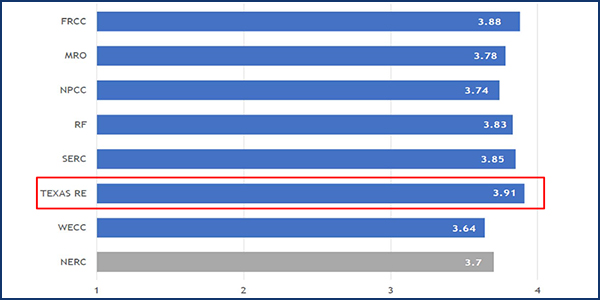TRE Board of Directors Briefs: May 15, 2019
New Processes Add Efficiency, Effectiveness
Stressing the importance of being efficient and effective, the Texas Reliability Entity’s Derrick Davis last week shared with his Board of Directors a new process to help the regional entity devote more time to its ERO responsibilities.
“I’m going to say more efficient and more effective 1,000 times,” said Davis, director of enforcement, reliability standards and registration, during the board’s Wednesday meeting.
Davis told the board that the RE’s new mitigation verification sampling process will be, of course, “more efficient and more effective” in resolving smaller issues, freeing up staff to perform other tasks.
TRE staff will verify mitigation for compliance exceptions on a sample basis. Registered entities will be required to provide an affidavit identifying the details of mitigation activities and source documents. Entities will hold the mitigating evidence for 18 months after being notified of compliance exception treatment or upon completion of mitigation activities, whichever is later.
Staff have also begun using a new triage process to obtain disposition information faster. Davis said enforcement staff will ask for “pertinent disposition information” earlier in the process than before, leading to quicker validations.
“In the past, we haven’t had an answer for an entity that self-reports and waits for the enforcement group to get with them,” he said. “We’re going to get to you faster now, so that we can close these out.”
2020 Risk Elements Focus on Resource Adequacy
Staff have proposed three regional risk elements to focus on for 2020: data integrity and situational awareness; resource adequacy; and insufficient dynamic performance and loadability by transmission and generation providers.
Risk Assessment Manager Jeff Hargis told directors that risk elements are translated into audit scopes. These specific, defined risks are determined on an annual basis, he said.
“We live in the future,” Hargis said.
He said the resource adequacy risk is not a result of ERCOT’s slim summer reserve margins, but whether or not resources adequately support frequency and voltage and stay online during transient events. Multiple resource failures can lead to system instability or a significant loss of generation, Hargis said.
Texas Tops Other REs in Effectiveness Survey
COO Jim Albright told directors that TRE bested all other REs on NERC’s 2018 ERO effectiveness survey. The Texas RE registered an average score of 3.91, based on a 5-point scale; the Florida Reliability Coordinating Council came in second, with an average score of 3.88.
TRE received its highest score (4.23) for its business planning and budgeting process, which stakeholders found provide reasonable opportunities for input and offer sufficient information, Albright said. It was also rated highly for its audit reports and audit process (4.19 and 4.14, respectively) and for enforcement (4.13).
The organization fared poorest in enforcement and standards, with no score higher than 3.77. Still, it was rated highest among the regions for its regional reliability standards addressing risk in a cost-effective manner.
Respondents favorably commented on the “competent” compliance monitoring and enforcement staff and found the organization’s self-certification process to be an “effective engagement method.” However, they dinged TRE for a lack of transparency and consistency on the penalty and internal risk assessment processes.
“When you look at the number of penalties we actually had, it’s a small number,” Albright said, noting TRE has only assessed “six or seven” penalties in recent years. “The opportunities to be transparent are few and far between.”
The ERO effectiveness survey, composed of 76 questions across five topic areas, is conducted every two years. TRE received 92 responses in 2018, up from the 54 it received in 2016. It has 222 entities registered in its region.
“We’re reaching more people, which is a good thing,” Albright said.
He also said TRE’s certification process has received a clean report from NERC.
Board Approves 2018 Budget, Audit
The directors approved the RE’s 2020 business plan and budget of $13.8 million, a 5.8% increase over the current budget. The approval is subject to “no material changes,” as NERC has not completed its review of the budget.
The Member Representatives Committee approved the budget May 3.
The board also approved accounting and advisory firm BKD’s 2018 financial audit report, which had no reported findings, and accepted its financial statements for the same year.
— Tom Kleckner



